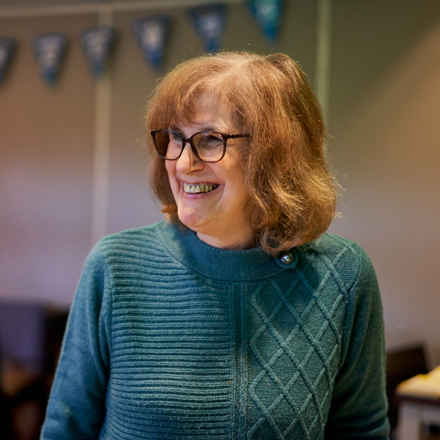"Volunteering is very fulfilling and it keeps your brain and body active”
Posted: Monday 03 June 2024
When Tricia was diagnosed with macular disease, she already had a support system in place, thanks to her role as a volunteer with her local support group.
Coincidentally, ten years after helping to establish the Macular Society Haslemere Support Group, the 70-year-old found herself in need of the very support she had been providing to others.
Tricia started volunteering as a way of keeping herself active in retirement, responding to an advert in her local newspaper.
She said: “There were four of us that answered the advertisement and turned up to this meeting. We thought it was just to discuss what was to go on, but actually it was to run the group!
“One person has passed away since but the three of us still work hard to keep it going. We've become good friends and support one another in every way and we're still going strong.”
This week is Volunteers Week 2024, and Tricia never thought she’d still be volunteering today.
“I remember my husband told me not to go because it wouldn’t just be to make cups of tea. And actually it’s never just been making cups of tea. In fact, I’m glad it was never just that because I've learned an enormous amount.
“I didn’t think ten years later I’d still be volunteering. I think I said yes to see how it would go. The next day, 21 emails arrived for us each to read about all the rules needed to run the group and I wasn’t sure what we’d agreed to take on."
During her decade of service, Tricia was chairperson up until a couple of years ago and since then she has been coming to terms with her own diagnosis of retinal vein occlusion (RVO) and macular oedema.
She initially suspected she needed new glasses but was shocked to see wavy lines when she checked her vision against her Amsler grid.
She said: “I was devastated at the time. I couldn't see very well with the right eye, and it was awful, absolutely awful. When it happens to you, it's even worse than you thought.
“You have an idea of what’s happening and what will or could happen but it doesn't really make it any easier for you when you get that diagnosis.”
Tricia had some knowledge of macular degeneration as a result of her career as a GP but admitted how grateful she was to learn more from being involved with her local support group.
She said: “I've been quite positive since about six weeks on from getting that diagnosis. I was worried why it had happened and what if it happened to the other eye, or if my eye didn’t settle.
“But, you just need to have that positive mindset and not to let those things get on top of you. I don’t think about it now, it was initial shock of what was happening but being part of the support group helped.”
She added: “It's a two-way process all the way through anyway, they’ve helped me and I’ve always realised how well they all cope.”
For Tricia, who has cared for people for many years, it’s always been about ensuring people get the help they need from others in similar situations.
She continued: “On the whole, I think talking in a group where everyone else is touched by macular degeneration, I think that everyone has got lots of helpful hints. They come in and realise that other people are in the same boat as them and have the opportunity to discuss it with them and realise they're not alone."
Tricia added: “The thing about macular degeneration is it is a common thing and sight loss can make you very isolated so having the support group helps people realise that they don't need to be. So being able to help them is the good thing about volunteering.
“I'm glad I volunteered for the Macular Society because I just felt that was the right way to go. I had no idea what to do after working full-time, but it’s fitted together really well in the last 10 years.
“I would encourage people to volunteer, particularly after retirement, because it's very fulfilling and it keeps your brain active and your body active.”
Find out about the many roles and ways you can support people with macular disease.
Learn more on volunteering for the Macular Society
We need our volunteers more than ever, and we can help you find the role that’s right for you. Join today and you’ll receive a warm welcome from our team.
Find your local support group
Our support groups are for people of working age and older, and provide information, support and friendship to people with macular disease and sight loss. Find your local support group today.




